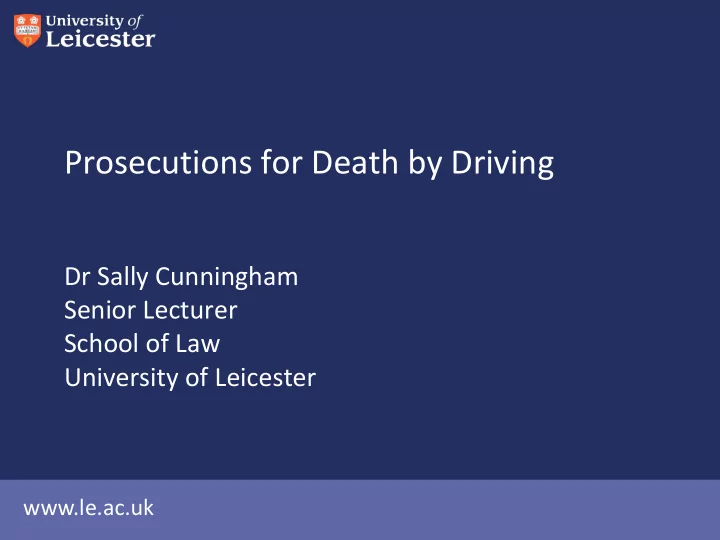

Prosecutions for Death by Driving Dr Sally Cunningham Senior Lecturer School of Law University of Leicester www.le.ac.uk
Causing death by driving offences: can they help achieve compliance? • England now has 4 causing death by driving offences. • Focus of paper is on causing death by careless driving (CDCD) • ACPO’s concept of “habitual” compliance based on developing social norms.
Responding to mistakes and errors on the roads: a dichotomous approach • The Government’s Strategic Framework for Road Safety suggests targeting enforcement at serious offending, whilst using remedial measures for those who make mistakes. • This correlates with the distinction psychologists make between Errors and Violations. • However, where death is caused, prosecution for the triable either way offence of causing death by careless driving, with a 5 year maximum sentence, ensues.
Causing death by careless driving defined • s.2B RTA 1988 Causing death by careless, or inconsiderate, driving A person who causes the death of another person by driving a mechanically propelled vehicle on a road or other public place without due care and attention, or without reasonable consideration for other persons using the road or place, is guilty of an offence. • s.3ZA(2) RTA 1988: A person is to be regarded as driving without due care and attention if (and only if) the way he drives falls below what would be expected of a competent and careful driver.
CPS guidance on the meaning of “careless” • overtaking on the inside; • driving inappropriately close to another vehicle; • inadvertently driving through a red light; • emerging from a side road into the path of another vehicle; • tuning a car radio; • using a hand-held mobile phone or other hand-held electronic equipment where the driver was avoidably distracted by that use; • selecting and lighting a cigarette or similar where the driver was avoidably distracted by that use.
Prosecutions for CDCD 08/10 – 03/12 • 248 offences reported in (mostly local) newspapers • 32 jury acquittals; 7 judge directed acquittals; 16 charge bargains (CDDD CDCD); 9 CDDD acquittals (CDCD is lesser included offence); 6 cases withdrawn/discontinued. • 18 cases tried in the m ags’ court (2 of these then committed for sentence). • Involvement of vulnerable road users: 36 cyclists, 53 motorcyclists and 69 pedestrians.
Sentencing guidelines The least serious group of offences relates to those cases where the level of culpability is low – for example in a case involving an offender who misjudges the speed of another vehicle, or turns without seeing an oncoming vehicle because of restricted visibility. Other cases will fall into the intermediate level.
Sentences for CDCD 08/10 – 03/12 • Evidence that judges find such cases extremely difficult. • “No sentence could redress the loss” • “She is deeply remorseful and this is not a case where there is the kind of misconduct that can be deterred by the passing of a custodial sentence” (Judge William Wood QC in R v Stocker). • Most lenient sentence = 3yr conditional discharge. • Most severe sentence = 4 ½ years’ prison.
Conclusion: The role of the media
Recommend
More recommend